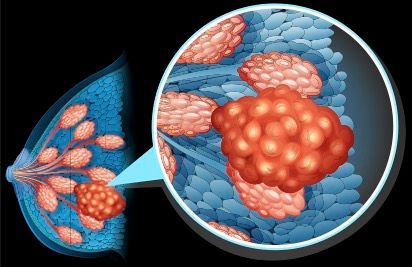Giredestrant Exhibits DFS Improvement in Early-Stage Breast Cancer
According to the developers, giredestrant is the first oral SERD to display beneficial DFS in early-stage breast cancer in the adjuvant setting.
Regarding giredestrant’s safety profile, the regimen was well tolerated, with no unexpected safety findings observed; adverse effects were consistent with its known profile.

Adjuvant endocrine treatment with giredestrant (GDC-9545) displayed a statistically significant and clinically meaningful improvement in invasive disease-free survival (DFS) vs standard-of-care therapy among patients with estrogen receptor (ER)–positive, HER2-negative early-stage breast cancer in the phase 3 lidERA trial (NCT04961996), according to a news release from the developer, Roche.1
The phase 3 trial met its primary end point of invasive DFS at a preplanned interim analysis. lidERA is the first phase 3 trial evaluating a selective estrogen receptor degrader in the adjuvant setting to display significant benefit among patients with early-stage breast cancers.
“[The trial’s] results underscore the potential of giredestrant as a new endocrine therapy of choice for [patients] with early-stage breast cancer, where there is a chance for cure,” Levi Garraway, MD, PhD, chief medical officer and head of global product development at Roche, said in the news release.1 “Given that ER-positive breast cancer accounts for approximately 70% of cases diagnosed, these findings—together with recent data in the advanced ER-positive setting—suggest that giredestrant has the potential to improve outcomes for many [patients] with this disease.”
At the time of the interim analysis, the overall survival (OS) data were immature but a positive trend was recorded. Additionally, regarding giredestrant’s safety profile, the regimen was well tolerated, with no unexpected safety findings observed; adverse effects were consistent with its known profile. The developers plan to present data from the trial at an upcoming medical meeting and share them with health authorities.
The rationale for lidERA was based on results from the phase 2 coopERA trial (NCT04436744), which showed that neoadjuvant giredestrant displayed an improved reduction in Ki67 levels vs aromatase inhibitors in the first-line ER-positive, HER2-negative setting.2 Additionally, giredestrant previously displayed a significant reduction in the risk of death or progression vs endocrine therapy, both with everolimus (Afinitor), to treat patients with ER-positive, HER2-negative advanced breast cancer previously treated with a CDK4/6 inhibitor in the phase 3 evERA trial (NCT05306340).3
The lidERA trial enrolled more than 4100 patients with medium- or high-risk stage I to III ER-positive, HER2-negative breast cancer and randomly assigned them to receive 30 mg of giredestrant once daily or endocrine therapy of physician’s choice.4 These were limited to specified third-generation aromatase inhibitors: letrozole (Femara), anastrozole (Arimidex), and exemestane (Aromasin). Patients in both arms received daily therapy in 28-day cycles for 5 years in the absence of disease recurrence or unacceptable toxicity.
The primary end point of the trial was invasive DFS. Secondary end points included OS, invasive DFS from second primary nonbreast cancers, DFS, distant recurrence-free interval (RFI), locoregional RFI, quality of life, and safety.
Those enrolled in the phase 3 study had documented ER-positive, HER2-negative disease; had undergone definitive surgery of their primary breast tumors; and had a washout period of at least 21 days between last adjuvant chemotherapy dose and random assignment. Additional inclusion criteria included resolution of all acute toxic effects of prior anticancer therapy or surgery, an ECOG performance status of 0 to 2, and adequate organ function.
Those ineligible for enrollment included those who received treatment with an investigational therapy within 28 days prior to study initiation, receipt or planned receipt of adjuvant or neoadjuvant CDK4/6 inhibition, active cardiac disease or a history of cardiac dysfunction, or a diagnosis of stage IV breast cancer. Additionally, those with any prior malignancy within 3 years of screening; those who received any prior selective ER modulation, degradation, or inhibition; and those with renal dysfunction requiring dialysis were excluded from trial participation.
References
- [Ad hoc announcement pursuant to Art. 53 LR] Roche’s giredestrant becomes the first oral SERD to show superior invasive disease-free survival in early breast cancer. News release. Roche. November 18, 2025. Accessed November 18, 2025. https://tinyurl.com/yvkb6j5e
- Hurvitz S, Park YH, Bardia A, et al. Neoadjuvant giredestrant (GDC-9545) + palbociclib (palbo) vs anastrozole (A) + palbo in post-menopausal women with oestrogen receptor-positive, HER2-negative, untreated early breast cancer (ER+/HER2- eBC): interim analysis of the randomised, open-label, phase 2 coopERA BC study. Abstract presented at: European Society for Medical Oncology Congress 2021; September 16-21, 2021. Abstract LBA14.
- Mayer E, Tolaney SM, Martin M, et al. Giredestrant (GIRE), an oral selective oestrogen receptor (ER) antagonist and degrader, + everolimus (E) in patients (pts) with ER-positive, HER2-negative advanced breast cancer (ER+, HER2- aBC) previously treated with a CDK4/6 inhibitor (i): primary results of the phase III evERA BC trial. Abstract presented at: European Society for Medical Oncology Congress 2025; October 17-21, 2025; Berlin, Germany. Abstract LBA16.
- A study evaluating the efficacy and safety of adjuvant giredestrant compared with physician's choice of adjuvant endocrine monotherapy in participants with estrogen receptor-positive, HER2-negative early breast cancer (lidERA Breast Cancer). ClinicalTrials.gov. Updated August 24, 2025. Accessed November 18, 2025. https://tinyurl.com/sat6z4zu
Gedatolisib Combo With/Without Palbociclib May Be New SOC in PIK3CA Wild-Type Breast Cancer
December 21st 2025“VIKTORIA-1 is the first study to demonstrate a statistically significant and clinically meaningful improvement in PFS with PAM inhibition in patients with PIK3CA wild-type disease, all of whom received prior CDK4/6 inhibition,” said Barbara Pistilli, MD.